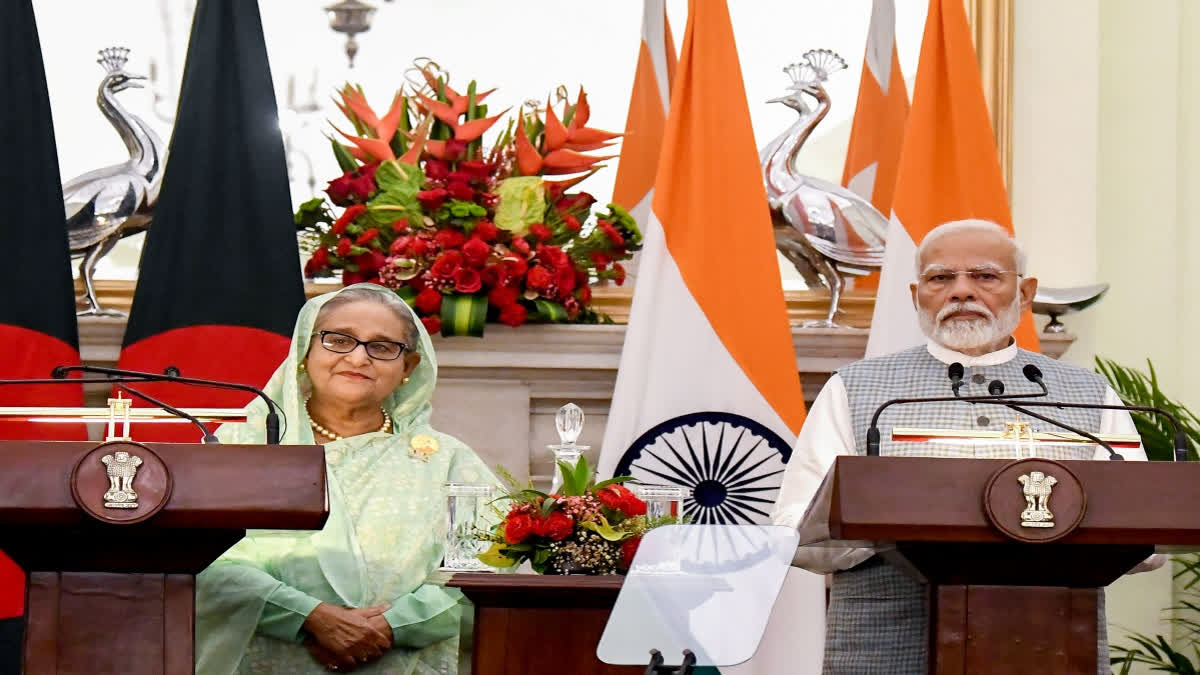Nobel laureate Muhammad Yunus took over as the head of Bangladesh's caretaker government on Thursday, August 8, after Prime Minister Sheikh Hasina, New Delhi's staunchest ally, succumbed to protests and resigned on August 5, 2024, and left the country for India. With the possibility of the presence of the Bangladesh Nationalist Party (BNP) and Jamaat-e-Islami (JeI) a banned terrorist organisation in the interim government, an anti-Indian interim regime can put a strain on the New Delhi-Dhaka relationship despite the fact that the BNP coming to power after next elections and perhaps Khaleda Zia were to take over as head of Bangladesh.
This probable change will obviously be a significant setback to India's security strategy in waning India's regional influence in the South Asian region. For India, the security calculus with Bangladesh is viewed through connectivity, refugee risks, terror activities, the Bay of Bengal and military cooperation.
Connectivity
Bangladesh shares a 4,096 km border with India, which is located to provide India easier access to West Bengal and northeast states Assam, Meghalaya, Mizoram, Tripura, West Bengal and as well as to the Bay of Bengal to ameliorate its trade and connectivity. A disorder in ties with Dhaka could hamper the existing road routes permitting to use of the territory of Bangladesh and agreements for using Chittagong and Mongla ports to transport goods to northeastern states and delay the Agartala-Akhaura cross-border rail link launched in November 2023. Moreover, "Chicken’s Neck" (Siliguri Corridor) is a vital narrow passage connecting the Indian mainland to the northeastern region. Any interruption and commotion in this tactically sensitive area hits hard on India's strategic leverage by segregating the region from the mainland, making it susceptible to face potential security threats.
Refugee Risks
There is an intense risk of infiltration across the border with Bangladesh, Hasina’s followers seeking refugee status and political asylum in India and moreover, particularly by minority Hindus, who may feel unsafe under the new government could lead to an impact on local politics and security. In response to the instability in Bangladesh, Meghalaya has imposed a night curfew along its international border and the Border Security Force (BSF) has increased its vigilance along the border to prevent unauthorised crossings.
Terrorism
Counter-terror cooperation is a key facet of the relationship between India and Bangladesh as militant groups hostile to India are operating in Bangladesh using a geographically disadvantaged northeast region. Besides, India is subject to cross-border terrorism from groups based in Pakistan, and these groups use Bangladesh as a transit point into India.
Hasina's regime implemented a 'Zero Tolerance' policy towards terrorism and cracked down on anti-India elements. Dhaka maintained close cooperation with New Delhi in terms of intelligence sharing and also entered an Extradition Treaty with India in 2013. Many times, Bangladesh has arrested and handed over activists of the United Liberation Front of Asom (ULFA) to India.
During the regime of Khaleda Zia (1991-1996 and 2001-2006), Bangladesh supported Pakistan and promoted Inter-Services Intelligence (ISI) sponsored militant groups to enter to attack or escape through Bangladesh after the terror attacks. The BNP-JeI coalition government facilitated ISI to assist the terror groups of the Northeast like ULFA, National Socialist Council of Nagaland (NSCN), and All Tripura Tiger Force (ATTF) through the supply of arms, financial assistance, technical assistance and in sending insurgents to travel to Pakistan from Dhaka for training in guerrilla warfare.
The current flux in Bangladesh and probable BNP-JeI government with the support of ISI provides a fertile ground for the above groups and Bangladeshi terror outfit Harkat-ul-Jihad-al-Islami (HuJI) tied with Pakistani militant organisations to regroup and receive support could reignite terrorism in the northeast. Moreover, Tareque son of Zia has close ties with ISI and terror operatives including ULFA chief Paresh Baruah and Dawood Ibrahim will definitely pose a danger to the internal security of India.
Bay of Bengal
Bangladesh which is positioned at the top of the Bay of Bengal that spans the Indian Ocean Region from Africa to Indonesia is strategically significant for ensuring the primary interests of New Delhi due to its proximity to the Strait of Malacca, one of the world's key maritime chokepoints that connect the Indian Ocean with the South China Sea.
Accordingly, it is in New Delhi's paramount concern that it maintains close cooperation with Dhaka to ascertain its control in the Bay of Bengal and to make certain its dominance to foil China's growing and aggressive presence in the region. The continuation of the current crisis and if relations with Bangladesh were to get worse under a possible Zia government, India may lose its control in the Bay of Bengal because China will take advantage of the crisis to expand its influence by offering economic and military support to the new regime to undermine India's strategic position for its foothold in the Bay of Bengal.
The instability in Bangladesh may deter India and Bangladesh from exercising the cooperation and coordination between the navies and coast guards to engage in challenges like climate security, human trafficking, arms and drugs smuggling and also BIMSTEC (Bay of Bengal Initiative for Multi-sectoral Technical and Economic Cooperation) programmes.
Military Cooperation
India has been building a long-term strategic partnership with Bangladesh and make certain that it does not be carried into China's sphere of influence. Both New Delhi and Dhaka are involved in the joint military exercise 'Sampriti', training programs, medical assistance and supply of military equipment by India.
Bangladesh had inked a deal with India under the $500-million line of credit for the purchase of defence hardware, coast guard patrol boats, and communication equipment and also talks were underway to buy spares for maintenance for its Russian-origin MiG-29 and Mi-17 helicopters. The current turmoil in Bangladesh is an impediment to the future of military cooperation that had expanded gradually during a period of time as a counter to Beijing.
It seems the US, Pakistan and China had nefarious plans to wield influence on Bangladesh and to establish an anti-India regime headed by BNP-JeI. In past also they have executed such measures by establishing an anti-India regime headed by Khondakar Mostaq Ahmad, after Sheikh Mujibur Rahaman's murder. At present, the cancellation of the US Visa of Sheikh Hasina exposes the evil intentions of the US. On top, the student wing of JeI, Islami Chhatra Shibir (ICS) trained by ISI, China's Ministry of State Security's propaganda played a pivotal role in turning peaceful protests of the unpopular quota system along with news of competitive exam leaks led to the flare-up of violent incidents like brutal killings of Awami League leaders, actor Santo and his father, blazing the residence of folk singer Rahul Anando and attack Hindus.
At this moment, to tackle the challenge, India’s primary and predominant policy is to ensure that a major partner in India's Act East Policy and a dependable ally in the BIMSTEC does not become a fundamentalist Islamic state. In view of that, New Delhi's first and foremost step is to move fast to connect with the incoming government and it has to pull the diplomatic channels to engage the US and UK for stability and cooperation in South Asia. Notably, it must look into proposals to restrain the existing anti-India sentiment rampant in Bangladesh for staunch backing of Hasina and put an effort to get in touch with BNP for cordial rapport which is a Herculean task.
In an unavoidable situation, if the new government continues an anti-India approach, India must consider an action like R&AW's "Operation Farewell" which designed an uprising against the pro-ISI, pro-CIA Ershad regime (1983-1990) enforced to resign to from a neutral government.
(Disclaimer: The opinions expressed in this article are those of the writer. The facts and opinions expressed here do not reflect the views of ETV Bharat)



